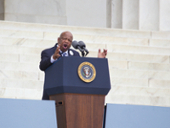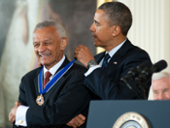Loving the Foreigner Among Us: World Relief Hosts Discussion on Immigration

"When Jesus said, 'love your neighbor as yourself,' (Mark 12:31), there was no asterisk.He didn't say, 'Love your neighbor, only if it's in your national security interest to do so,'" remarked Jenny Yang, Senior Vice President of Advocacy and Policy at a recent World Relief event hosted at DBU.
"He didn't say 'Love your neighbor, only if it's in your economic interest to do so.' He said simply to love your neighbor as yourself."
Yang spearheaded a dialogue on Justice, Compassion, and Truth: A Discussion on Immigration. She was joined by partner organizations of World Relief including Seek the Peace, Welcoming Immigrants, The Refugee Empowerment Network, and Southcliff Baptist Church.
"As Western Christians, we've asked the political questions before asking the theological questions," said Yang. While politics inform our systems, Scripture should instruct our heart. Yang continued by demonstrating the series of migration stories throughout the biblical narrative.
Abraham fled famine and conflict. Joseph was sold out of Canaan into slavery in Egypt, from which Moses led the Israelites to freedom. The Exodus itself, the story of God's people fleeing oppression and seeking refuge, provides the overarching narrative of the Old Testament.
In Leviticus 19, God simultaneously commands the welcome of strangers and reminds Israel of their heritage as foreigners: "You shall treat the stranger who sojourns with you as the native among you, and you shall love him as yourself, for you were strangers in the land of Egypt: I am the Lord your God." Modern-day believers share this status as aliens in a strange land awaiting rescue.
Refuge is evident in the biblical lineage, the story of our salvation, and the life of our Savior.
Jesus and His family fled a tyrannical government to dwell in a foreign land. As highlighted by Yang, the instruction found in Mark 12 concerning the greatest command comes not only from the mouth of our Savior but the mouth of a refugee.
"For I was hungry and you gave me something to eat, I was thirsty and you gave me something to drink, I was a stranger and you invited me in" (Matthew 25:35). Jesus's example prompts us towards a love of neighbor which mirrors God's command to care specifically for foreigners.
Extending love to Jesus seems natural. Yet, our wrestle with fear leads us to refuse that same love for strangers. Yang emphasized that "Scripture calls us to love the people the world wants us to hate."
The New Testament challenge continues as Paul urges the forming church to practice hospitality (Romans 12:13), specifically by welcoming outsiders (Hebrews 13:2). In both cases, Yang noted that the Greek word "Philoxenia" is used to challenge us towards a "love of the stranger," though our worldly culture is more conditioned towards "Xenophobia", or "fear of the stranger."
Today, 70 million of God's image-bearers are seeking refuge. "Statistically, less than 1% of those people will ever be resettled to a safe country," Tess Clarke, Seek the Peace, remarked on the scale of hopelessness.
In the wake of oppression and conflict, people become displaced and dependent upon the UNHCR resettlement pipeline. As the number of applicants for legal resettlement increases, the doors for refuge continue to decrease.
During the panel discussion, Yang remarked that the United States has historically led the initiative for accepting refugees; a reality on trajectory to be reversed.
Under the Refugee Act of 1980, an annual ceiling for refugee admission to the United States was established via executive order. The ceilings from 2000 to 2016 averaged between 70,000 to 90,000 admissions. However, 2017 began a series of reductions towards the lowest admissions in U.S. history; 50,000 declined to 45,000, which declined to 30,000 and then to 15,000 in 2020.
Immigration is complex. However, we recognize that systems mirror the disposition of our nation. While few citizens are positioned for national leadership, every individual is responsible for the condition of their hearts. This condition is not to be underestimated, as the spirit of one contributes to the heart of the whole.
The scope of forced migration and barriers for legal refuge give reason for pause; for both personal evaluation and reflection upon migration's impact on the spread of the Gospel.
As noted by Yang, "86% of refugees in America are likely to already be Christian or become Christian. The movement of people is part of God's divine plan to bring people to know Him. By choosing to engage with refugees in our communities, the church can fulfill both the Great Commission and the Greatest Commandment at the same time."
Yang posed a final question to the audience. "My question to us as the church is, will we allow fear to define our response to the stranger? Or will we see this as an incredible missional opportunity to reach the nations without ever having to leave our own backyards?"
Our backyards are rich with opportunity as Texas resettles more refugees than any state. While politics debate the future flow of admissions, there are current everyday opportunities for us to "Seek to restore what conflict has undone, seek to understand rather than be understood, and contend for the flourishing of the vulnerable," as stated by Clarke.
World Relief exists for this reason: "To equip the local church to serve the most vulnerable." Volunteers are needed to assist with ESL classes, youth soccer teams, mentoring, tutoring, and serving the local refugee population. Would you consider volunteering with World Relief and its partners to care for the vulnerable around you?
Bailey Pylant was the Coordinator of News and Social Media for University Communications at Dallas Baptist University from 2017-2021.





